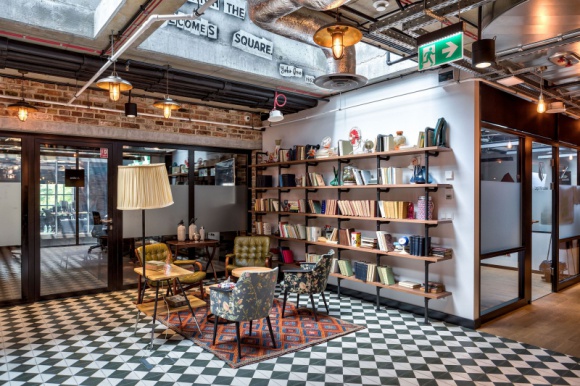Mindspace vs COVID-19
Organizing professional, safe workspaces that comply with regulations in times of pandemic requires not only a thorough analysis of the current situation, but also the ability to adapt quickly to new conditions. Mindspace, a global operator of boutique flexible workspaces, currently present in 31 locations in 16 cities around the world, can share its experience in this area. In markets such as Germany and Israel, Mindspace observes that the current demand for its space is even higher than in the pre-pandemic period. A video conference entitled “Impacts of coronavirus on the office space market in Poland - the broker’s angle”, which will take place on 30 July 2020, will serve as an opportunity to further explore this subject. The speakers will include representatives of Mindspace as well as advisory agencies such as JLL, CBRE, Colliers International, and Cushman & Wakefield. We invite you to participate!
The effects of the COVID-19 pandemic are being felt worldwide. The coronavirus has caused many changes—including changes in the office environment. Although it has been discovered that working from home is possible, it proves to be challenging in a number of aspects, predominantly due to our need for human connection. Other factors contributing to our desire to work in the office include an environment stimulating creativity and efficiency, heightened focus in the office, and teamwork.
The growing desire to return to work in offices is confirmed by the latest Mindspace survey, conducted in June this year among more than 1,100 members from seven countries. According to the survey, in Israel 57% of clients had already returned to their offices in Mindspace, and another 27% were planning to return within the next 4–8 weeks. In Germany, 33% of respondents had returned to Mindspace, with another 40% set to return in the next 4–8 weeks. The survey also confirms that 42% of members of the Polish Mindspace branch wanted to return to their offices during the same period, and in June, 27% of the community indicated they were already back at work in the branch. In markets that were heavily affected by the pandemic, such as the UK, demand is still slow but starting to rise. At Mindspace in Germany and Israel, demand is actually above pre-pandemic levels.
Yotam Alroy, Co-founder and CBO of Mindspace, commented: “We regard the last few months as a time of trial. A time where companies are trying to become most effective with their operations, financials and expenses. We also see many companies turning to flexible spaces as an alternative to conventional leases. The key attribute these days is flexibility. Everything that is flexible—especially workplaces—will gain value in the coming months. We are already observing that tenants’ choice of their offices depends not only on their own financial standing, but also on the stability and flexibility of the leased space. Mindspace is this kind of player in the office market, able to immediately adapt to the changes taking place and meet the expectations of its clients ‘here and now.’ In each of our locations, we offer flexibility in prices and space, which is a very desirable solution today.”
Real estate experts will discuss other consequences of the coronavirus pandemic affecting the office sector in Poland and forecasts for further development of the situation at an event to be hosted by Mindspace on 30 July 2020 at 10:00 a.m. The meeting will be held as a videoconference, open to all interested participants. In the discussion will participate representatives of Mindspace as well as advisory agencies such as JLL, CBRE, Colliers International, and Cushman & Wakefield.
We encourage you to participate!
Link to registration: https://www.eventbrite.com/e/impacts-of-coronavirus-on-the-office-market-in-poland-the-brokers-angle-tickets-114286520058

Deweloperzy ukrywają ceny mieszkań. Z troski o klientów czy swoje portfele?

Więcej przestrzeni, mniej hałasu – dlaczego Polacy coraz częściej wybierają przedmieścia?

Jak czytać rzuty mieszkań i uniknąć przykrych niespodzianek? AI ułatwia wybór
Więcej ważnych informacji
 Jedynka Newserii
Jedynka Newserii

 Jedynka Newserii
Jedynka Newserii

Handel

Polskie MŚP otrzymają większe wsparcie w ekspansji międzynarodowej. To cel nowej inicjatywy sześciu instytucji
Firmy z sektora małych i średnich przedsiębiorstw otrzymają kompleksowe wsparcie na potrzeby zwiększania konkurencyjności na arenie międzynarodowej. Taki jest cel wspólnej inicjatywy instytucji zrzeszonych w Grupie PFR pod szyldem Team Poland. Obejmuje ona zarówno wsparcie kapitałowe, w postaci gwarancji, pożyczek czy ubezpieczenia, jak i doradztwo oraz wsparcie promocyjne i informacyjne, dzięki czemu mikro-, małym i średnim firmom łatwiej będzie podjąć decyzję o ekspansji zagranicznej. Pierwszy projekt dotyczy wsparcia dla firm zainteresowanych uczestnictwem w odbudowie Ukrainy.
Bankowość
RPP zgodna co do potrzeby obniżania stóp procentowych. Trwają dyskusje dotyczące tempa tych decyzji

W lipcu Rada Polityki Pieniężnej po raz drugi w tym roku obniżyła stopy procentowe, określając swój ruch mianem dostosowania. W kolejnych miesiącach można oczekiwać kolejnych obniżek, ale ich tempo i termin będą zależeć od efektów dotychczasowych decyzji i wzrostu płac. Docelowo główna stopa procentowa ma wynosić 3,5 proc. Te okoliczności sprzyjają kredytobiorcom.
Handel
Umowa z krajami Mercosur coraz bliżej. W. Buda: Polska nie wykorzystała swojej prezydencji do jej zablokowania

– Polska podczas prezydencji w Radzie UE nie wykorzystała szansy na obronę swoich interesów w sprawie umowy z krajami Mercosur – ocenia europoseł PiS Waldemar Buda. W jego ocenie polski rząd, mimo sprzeciwu wobec zapisów umowy, nie zbudował w UE sojuszy niezbędnych do jej odrzucenia. Porozumienie o wolnym handlu spotyka się przede wszystkim z protestami europejskich rolników, którzy obawiają się zalania wspólnego rynku tańszą żywnością z krajów Ameryki Południowej. Według europosła wszystko może się rozegrać w najbliższych tygodniach.
Partner serwisu
Szkolenia

Akademia Newserii
Akademia Newserii to projekt, w ramach którego najlepsi polscy dziennikarze biznesowi, giełdowi oraz lifestylowi, a także szkoleniowcy z wieloletnim doświadczeniem dzielą się swoją wiedzą nt. pracy z mediami.




![Część środków z Planu Społeczno-Klimatycznego trafi na walkę z ubóstwem transportowym. Organizacje branżowe apelują o zmianę priorytetowych projektów [DEPESZA]](https://www.newseria.pl/files/1097841585/rower3,w_85,_small.jpg)




.gif)

 |
| |
| |
|